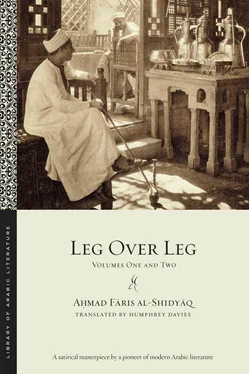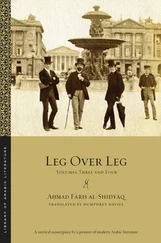1.1.20
Thereafter the Fāriyāq remained with his teacher, where he completed his study of the aforementioned book, after which the teacher became concerned lest the Fāriyāq get him caught up in matters that were beyond him and through them expose him, so he indicated to his father that he should remove him from the kuttāb and put him to work copying books at home (Wow! Wow!), which he continued to do for a long while, gaining therefrom as much as the likes of him could by way of improving his hand and memorizing certain words (Good for you! Good for you!). The people of that land gave precedence to good writing over anything else the hand might make, and, to them, one who wrote a good hand had achieved more than any of his peers. Despite this widespread attitude, the country’s ruler 117employed as scribes only those whose writing was ugly to the eye and whose words were disgusting to good taste (Oy! Oy!), this being a kind of public declaration that good fortune is not dependent on good handwriting, that to administer the law does not call for language without flaw (Abtholutely not!), 118and that they themselves have often attained lofty rank and exalted position though barely able to sign their noble names (Aiee! Aiee!).
1.1.21
The Fāriyāq, however, was not elated at having to practice this craft, believing that any earnings that might reach him through a slit as narrow as that in the nib of a pen must themselves be straitened (Alack! Alack!). 119True, many a person has obtained a living expansive and agreeable , as well as good fortune unabated and reliable , from a wellspring that, though broad by comparison with the pen’s nib, when measured against their greed and extravagance, was narrow (What a pity!). However, the Fāriyāq was then a greenhorn, with neither practice nor experience, given to judging what is distant by what is close — and nothing is closer to the eye of the scribe than the nib of his pen and the paper before him, or closer to his heart than the words he is writing. A clever fellow is he who accepts the craft that he practices, to whom the shame of hard work is no burden, and who does not crane his neck to look out for things at which he does not excel (No to the flesh! No to the flesh!).
(1) Al-Fīrūzābādī is wrong in deriving surriyya (concubine) from sirr meaning “coition.” In reality, the word derives from surr meaning “pleasure” ( surūr ).
CHAPTER 2. A BRUISING FALL AND A PROTECTING SHAWL
1.2.1
It was in the Fāriyāq’s nature, as is normal among the young, to imitate in dress, behavior, and speech those in his time distinguished by merit and knowledge. One day, he saw a wretched poet wearing a large round turban. The said wretched poet then being numbered among the masters, the Fāriyāq set his heart on having just such a turban, small as was his head, and he would walk along nodding under the weight of it to right and left, like a judge passing through the markets on his way home after Friday prayers saluting the people.
1.2.2
Now it happened once, when his father went to the ruler’s house, that he took him along with him, mounting him on a filly of his, while he rode a stallion. There they stayed for a number of days, on one of which the Fāriyāq got it into his head to take his filly for a gallop in the square, where the stallion was tied up to one side. He’d raced her one length of the square when his filly, passing the place where her friend was picketed, turned her head toward him as though to indicate that her dashing cavalier was unworthy to ride her past the prince’s steeds. The Fāriyāq promptly flew off and landed on his head, while the filly set off running, leaving him flat on the ground, though, had he been an expert horseman, she’d never have left him in such a state but would have waited for him to get up. He then arose, thanking God for the size of his turban, for it was that which had protected his head from receiving any of “the ten head wounds” 120(to wit, the bloodless abrasion and the bloodless graze, the break in the skin that brings blood but does not make it flow, the one that makes the blood flow, the one that enters the flesh without reaching the periosteum, the one that reaches the periosteum, the one that cuts to the bone, the one that breaks the bone, the one that shifts the bone, the one that leaves only a thin layer of skin over the brain, and the one that cuts to the brain).
1.2.3
However, he arose, having taken a blow to his loins, and that day made the discovery that there are benefits and advantages to a large turban, and he conceived the idea that the people of his country had taken to wearing large turbans simply to protect their heads and not to beautify their faces, for a huge turban hides the good qualities of the face and makes a small face look bad, not to mention that it hurts the head and blocks the ascent of vapors from the pores, something the Great Christian Master Physician 121prescribes.
1.2.4
If it be said, 122“If the sole reason for adopting large turbans is to protect people’s heads, not to adorn or beautify them, how do you explain the people who wear their turbans when they go to bed at night? Are they afraid their heads will roll off their pillows and fall into a chasm inside their houses, even though their bedding is placed on the floor?” I reply, “The origin of this custom lies in the fact that the women of that land are given to wearing on their heads those ‘horns’ that they there call ṭanāṭīr . 123These are made of silver or gold, and are as long as a forearm in height and as wide as a wrist. Now, if a man spends the night with his wife with nothing, or only a thin covering, on his head, he will be in danger of being bashed on his pate by her ‘horn’ and receiving from her one of the ten head wounds referred to above.”
1.2.5
If you were to insist on being argumentative and say, “What is the reason for these veritable horns? Are they placed there to remind one of the figurative horns that a man acquires when he goes against his wife’s wishes or is stingy with her or breaks off relations with her, or as a kind of adornment, or as a sign of women’s wantonness and greed, in that, when they catch the smell of riches on their husbands, they think that every inch of their bodies should be decorated and ornamented, believing as they do that, while such things should be concealed from the eyes of others, they should not be concealed from their eyes or those of their husbands (albeit there is many a difference over the matter, with some forbidding it and some taking an attitude of acquiescence), for the mere knowledge that something valuable is safely hidden away may give pleasure to its owner, just as, if a person squirrels away treasure in a concealed hoard, he may revel in it even though he cannot see it?” I would reply, “The idea that they are there to provide a reminder of the figurative horns is not to be entertained, for the women of that country maintain their honor and preserve their chastity, and especially the women of the Mountain. In addition, the husband’s cudgel, the hooked staffs of his own and his wife’s families, and the eyes of the neighbors prevent her from having the full range of marital traits ascribed to her; in the cities, on the other hand, such traits are stronger and more widespread.”
1.2.6
In origin, these “horns” were merely a device from which to suspend the face veil and, when first used, were small and short. Then they grew taller and larger as time went by and people got richer, a wife’s horns getting taller and larger the richer and better off her husband became. And this brings us to a bit of useful information that we have to mention: the word qarn (“horn”) is one that is common to all languages, 124like ṣābūn (“soap”), 125 qiṭṭ (“cat”), 126 mazj (“mixing”), 127and so on and has become famous among writers as a metonym for you-know-what on the part of the wife against the husband, except where Jewish writers are concerned, for in their books the horn has a positive significance, which is why you often hear in the Book of Psalms, “My horn has been exalted” and “You have exalted my horn” and “I shall butt with my horn” and so on. 128
Читать дальше












